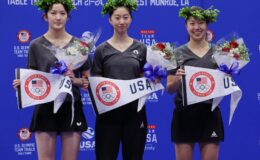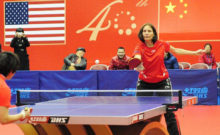Remembering Zhuang Zedong and Ping Pong Diplomacy with Judy Hoarfrost
by Wen Liu
It was sad that on Feb. 10, the Chinese New Year’s Day, Zhuang Zedong(庄则栋), the key figure of the legendary Ping Pong Diplomacy between the United States and China, passed away in Beijing. He died of cancer at age of 73.
Immediately, I thought of Judy Hoarfrost, of Portland, Oregon. I read her story before. She was a member on the original U.S. table tennis team that visited China in 1971.
I found the website of her business, where she is now co-owner, Paddle Palace, which offers “Everything for the Table Tennis Player,” and called her.
Do you remember meeting Zhuang Zedong? I ask. Yes, Judy said she remembered clearly the first time she saw Zhuang.
It was March 1971 in Nagoya, Japan, a time when the U.S. and China were Cold War enemies. Judy, 15, from a ping pong playing family in Eugene, OR, made the U.S. team for the World Table Tennis Championships there. Earlier, 19-year-old teammate Glenn Cowan missed the team bus and got a ride with the Chinese team. It was then, Zhuang Zedong, three-time world champion and captain of the Chinese team, made a simple, friendly yet history-making gesture, one that eventually led to the thaw of U.S.-China relations: he gave Cowan a silk brocade as a gift. Later in the arena for the matches, Judy and her teammates watched as Cowan returned a gift to Zhuang Zedong: a T-shirt with the Beatles’ words “Let It Be.”
Zhuang Zedong was of course the best and best-known table tennis player in China. When China was still very much closed to the outside world, Zhuang and his team brought international glory to the country. But Zhuang will probably forever be remembered more for his diplomatic move of gift giving to an American than his table tennis moves. He later said about the event that he didn’t really know what Chairman Mao was thinking, as he was just a ping pong player.
What Mao was thinking or looking for was exactly an opening in diplomatic relations with the United States. Zhuang handed that opening right to him. Without any delay, Mao invited the American table tennis team to China.
So on April 10, 1971, Judy along with her teammates and coaches flew from Japan to Hong Kong, took a train to China’s border town Shenzhen, crossed the Luohu Bridge, and became the first American visitors to China in 22 years since 1949. They shook hands with Premier Zhou Enlai, toured the Great Wall, ate banquets, and played ping pong in all three cities they visited, Guangzhou, Beijing and Shanghai.
If it had been surreal for Judy and her fellow American players to be in China in 1971, it was more so for those of us in China watching the events unfolding, especially when we were still living the frenzy of the radical Cultural Revolution: First, it was Mao inviting the American table tennis team. Then it was Mao inviting President Nixon of the United States! I still remember as clearly as yesterday how we were all summoned together to listen to a special government document to be read, explaining the strange development.
 My generation really grew up admiring Zhuang Zedong and his fellow table tennis players, both men and women. We all read the book The Spring of Table Tennis (乒乓运动的春天), a collection of stories of these first-rate ping pong players and our role models. Zhuang’s passing feels like the passing of a generation.
My generation really grew up admiring Zhuang Zedong and his fellow table tennis players, both men and women. We all read the book The Spring of Table Tennis (乒乓运动的春天), a collection of stories of these first-rate ping pong players and our role models. Zhuang’s passing feels like the passing of a generation.
Judy saw Zhuang Zendong again in 1972 when the Chinese team visited the U.S. Over the years, she also celebrated in both the U.S. and China the 25th, the 30th and the 40th anniversaries of Ping Pong Diplomacy. What do you feel about Zhuang Zedong’s passing? I ask again.
“Zhuang Zedong was a very important person in table tennis in China and in the sports of table tennis in the whole world. I feel connected to Zhuang Zedong, because we shared something that happened in our sport that brought our countries together. There have been huge changes in our relations and we are now tightly entwined. I am glad that I’ve had a special and personal role in this.”
Don’t we all feel connected to Zhuang Zedong, to Judy Hoarfrost, and to Ping Pong Diplomacy? After all, as we used to say in China, a small ball, ping pong, moved the big ball, the globe. It moved us all.
This article by Wen Liu is originally posted on her website Wen’s Pages




